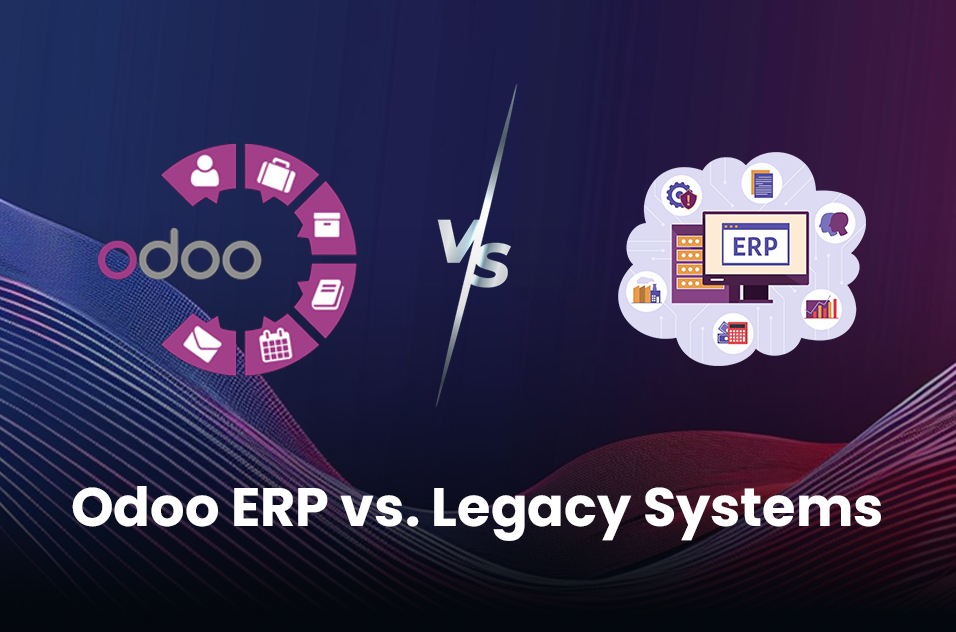
Odoo ERP vs. Legacy Systems is a critical question for organizations pursuing digital transformation. Odoo ERP systems deliver faster, more flexible, and cost-effective results compared to outdated legacy systems. Businesses working with Odoo consultants achieve seamless integration and agility, while legacy software companies often hold organizations back with expensive maintenance and poor scalability.
Moreover, the comparison of Odoo ERP vs. Legacy Systems is shaping digital transformation journeys worldwide,Like companies in the UAE, across the Middle East, and in the US increasingly favor Odoo ERP for its flexibility, scalability, and cost efficiency, while legacy systems struggle to keep pace with modern business demands.
Odoo ERP vs. Legacy Systems refers to the comparison between a modern, open-source Odoo ERP system and older, rigid software architectures.
Odoo consultants highlight that Odoo can be tailored quickly, while legacy software companies rely on costly legacy system modernization just to keep up.
The choice matters because it directly impacts how fast companies can achieve digital transformation.
Key reasons this comparison is important:
In short, Odoo ERP empowers businesses to grow quickly, while legacy systems create bottlenecks.
When businesses compare Odoo ERP vs. Legacy Systems in real-world operations, the difference is striking.
This makes Odoo ERP a proven accelerator for digital-first strategies.
The benefits of adopting Odoo ERP over legacy systems are significant.
Top advantages of Odoo ERP:
By contrast, legacy software companies lock businesses into expensive, outdated models, and legacy system modernization often acts as a temporary patch, not a solution.
Every sector feels the impact of Odoo ERP vs. Legacy Systems, but some industries gain faster returns:
Industries that need agility and innovation find the Odoo ERP system far superior.
While Odoo is the better solution, migration from legacy systems can pose challenges:
This is why Odoo consultants play a crucial role, ensuring smooth migration, training, and ROI-focused deployment.
Expert Odoo consultants make the transition from legacy systems to Odoo ERP much easier:
This ensures businesses achieve faster digital transformation without disruption.
The reality is that legacy system modernization rarely competes with Odoo ERP.
Ultimately, modernization is a band-aid, while Odoo ERP is a future-ready solution.
When comparing Odoo ERP vs. Legacy Systems, the conclusion is simple: Odoo wins.
In contrast, legacy systems slow growth and force expensive upgrades. Businesses serious about digital transformation should migrate, not modernize.
The future belongs to adaptable, scalable platforms, and in that future, the Odoo ERP system leads the way.
FAQs
What does Odoo ERP vs. Legacy Systems mean in digital transformation?
Odoo ERP vs. Legacy Systems compares a modern, open-source ERP platform like Odoo with outdated, rigid legacy software. While Odoo is modular and cloud-ready, legacy systems are often difficult to upgrade or integrate.
Why is Odoo ERP faster than legacy systems for business growth?
Odoo ERP accelerates digital transformation through automation, scalability, and real-time insights. Legacy systems rely on manual processes, making them slower and less adaptable.
How do Odoo consultants add value compared to legacy software companies?
Odoo consultants customize and implement solutions quickly with minimal coding. In contrast, legacy software companies often demand high fees for upgrades and lack agility in integration.
Is migrating from legacy systems to Odoo ERP expensive?
Initially, migration may seem costly, but Odoo’s subscription model and lower maintenance fees provide long-term savings. Legacy system modernization often costs more without delivering innovation.
What are the risks of staying on legacy systems instead of moving to Odoo ERP?
Businesses risk high maintenance costs, poor scalability, and slow innovation. Legacy software companies rarely provide future-ready solutions, limiting digital transformation.
How does Odoo ERP improve integration compared to legacy systems?
Odoo ERP connects seamlessly with modern tools such as eCommerce, CRM, and analytics. Legacy systems often operate in silos, making integration expensive and complex.
Can legacy system modernization compete with Odoo ERP migration?
Modernizing a legacy system only extends its life; it doesn’t solve cost, scalability, or innovation challenges. Odoo ERP migration offers a more future-proof solution.
What challenges do businesses face when shifting from legacy systems to Odoo ERP?
Challenges include data migration risks, employee resistance, and integration gaps. However, with expert Odoo consultants, businesses can overcome these hurdles smoothly.
Why should companies in the UAE, the Middle East, and the US prefer Odoo ERP vs. Legacy Systems?
Because these markets demand flexibility and scalability, Odoo ERP offers cloud-based solutions at a fraction of legacy system costs, driving faster digital transformation.
By continuing to use the website, you agree to our Cookie Policy. To learn more about how we process your personal data, read our Privacy Policy
